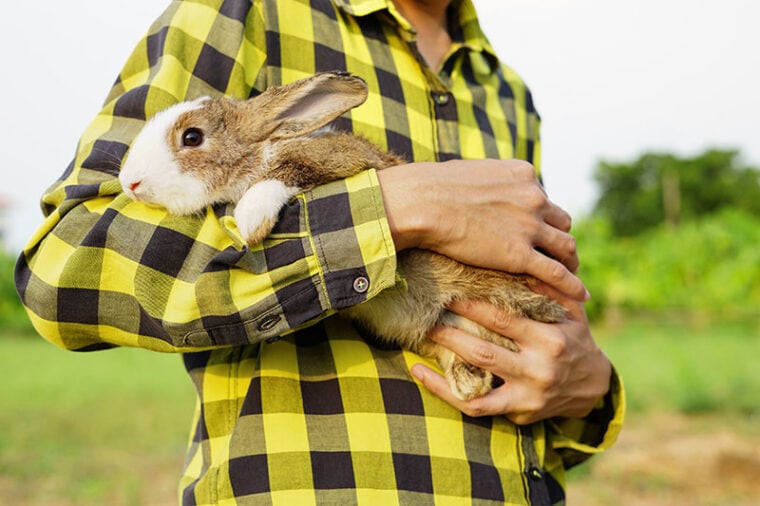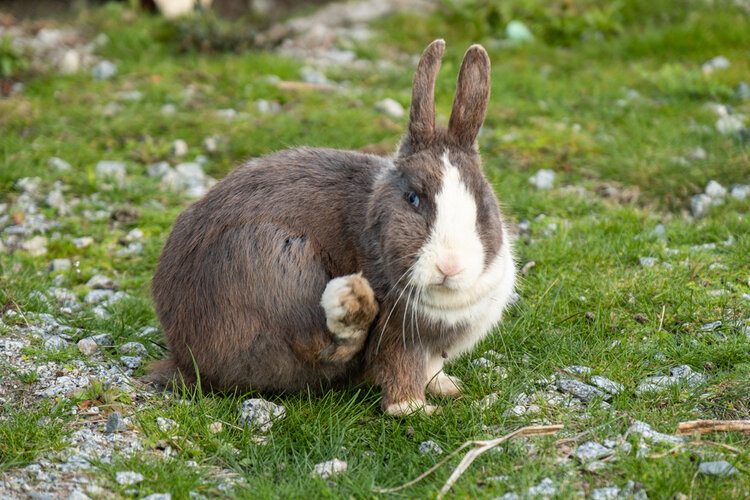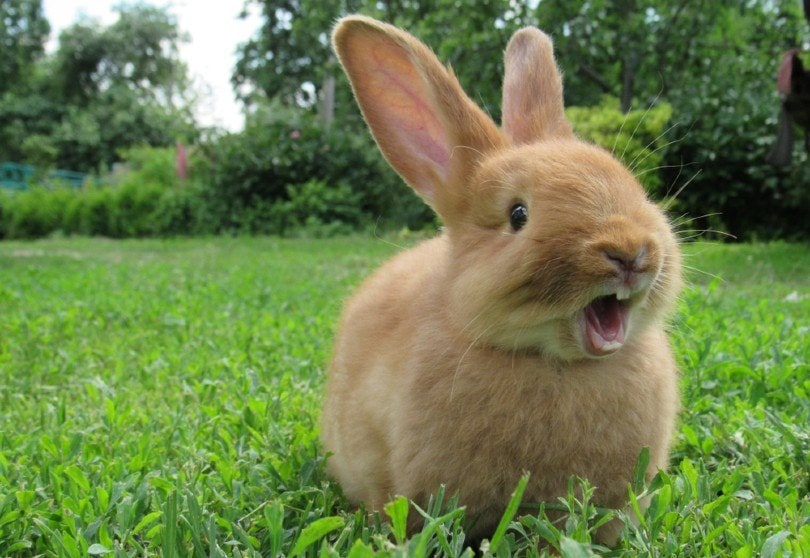
Rabbits may be cute and cuddly, but they do exhibit some strange behaviors at times. For instance, if you’ve ever cuddled with a rabbit, you may notice that they try to dig into your clothes or the seat next to you. Even if you aren’t paying attention to your rabbit, they may do this for a variety of reasons.
Luckily, this behavior is normal, and you can correct this behavior with proper training or by meeting your rabbit’s unmet needs. Below, we’ll go over all the major reasons your rabbit may scratch or dig on your clothes.
The 7 Reasons Why Your Rabbit Digs and Scratches Your Clothes
1. Aggression
Scratching at your clothes can be a sign of aggression. Usually, this occurs when the rabbit is not spayed or neutered. In this case, surges in hormones may make your rabbit more territorial and defensive, leading to aggression.
They may be digging at your clothes to make you leave, mark you with their scent, or show their general discomfort. Some may be upset and not really know why.
Spaying or neutering your rabbit may make them less aggressive and prone to this behavior. If you aren’t planning on breeding your rabbit, then spaying or neutering them is recommended. Typically, this is done between 4 and 6 months of age.

2. The Teen Phase
Rabbits go through a “teen” phase, just like humans. During this phase, they may be more frustrated, aggressive, and hyperactive. It’s a rather weird stage for rabbits, but it is temporary and usually subsides after a few months. During this stage, your rabbit may be more likely to “try out” new behaviors. It is important to correct behaviors you don’t want them to do. If the behaviors are corrected when they first pop up, they’re much less likely to continue. Correcting them later on is much more challenging.
Usually, this phase pops up around 5–8 months of age.
3. Filing Their Nails
Rabbits have to keep their nails filed down, just like dogs, cats, or humans. Their nails continuously grow. If they aren’t filed down properly, they can be painful. Therefore, many rabbits will seek out opportunities to file their nails down, especially if they’re on the cusp of being too long.
If your rabbit’s nails are long upon inspection, it’s time to trim them. Trimming their nails will likely stop this behavior and is something you should be doing anyway. You can trim their nails yourself using a pair of nail clippers designed for small animals. Alternatively, you can also get a vet or groomer to do it for you.

4. There Is an Unpleasant Smell
Rabbits are sensitive to certain smells. If they pick up on any of these smells, they may dig in an attempt to make them go away. In other words, they could be trying to bury whatever they consider smelly.
Of course, you may think that you smell fine. However, rabbits are often sensitive to all kinds of scented products, including perfume, laundry detergent, and deodorant. If you switch products and your rabbit suddenly starts digging at your clothes, it may be a sign that they don’t like how you smell. If your rabbit only digs at one person, the same explanation may be at play.
5. They Want Attention
If your rabbit wants attention, they may attempt to get it by scratching at you. If you typically give your rabbit attention after they scratch at you, then it only encourages them to scratch at your clothes more. In some cases, this isn’t much of a problem, especially if you keep your rabbit’s nails trimmed. However, if you don’t want this to become a habit, it’s important to not encourage the behavior.
If your rabbit does this a lot, we recommend adding more toys and activities to their day. Your rabbit may need more attention, for instance. Or, they may simply be bored and need more things to do during the day. Either way, scratching for attention may be a sign that your rabbit needs more stimulation.

6. You’re in Their Way
There is also the possibility that you’re in your rabbit’s way. Maybe you’re in their favorite sleeping spot. Or, you may be sitting on the floor where your rabbit usually walks. They may want to play in that area or think that you’re sitting on something they want.
Either way, it’s a sign that they want you to move. They may scratch or dig at you. Sometimes, it may even seem like they’re trying to dig under you.
You can avoid this issue by paying attention to where your rabbit typically likes to lie and not sitting there. Of course, it’s not necessarily required that you’re proactive in this regard. You can also just wait for your rabbit to ask you to move.
7. Asserting Dominance
It may also be that your rabbit is asserting dominance over you or another rabbit. Rabbits may dig your clothes in an attempt to “fight” you or claim you as their territory. This behavior mostly occurs in unneutered males, though it can also be done by females. If there are multiple rabbits in the household, then this behavior will probably increase.
You shouldn’t reward this behavior, as it can lead to aggression in some cases. You want to discourage it if you can. Spaying and neutering your rabbits can lead to less asserting, too.

Final Thoughts
Scratching and digging are not necessarily bad behaviors that you need to put an end to. In many cases, this is just a way that your rabbit communicates. However, they may be communicating a need that you need to deal with. For instance, your rabbit may be trying to wear down their nails, which would indicate that they need them trimmed.
Listening to your rabbit’s communication is important, as it helps you take care of them better. However, it can also be a negative behavior that needs correcting, such as when your rabbit is using it as a form of aggression.
You Might Also Be Interested In:
Featured Image Credit: Verin, Shutterstock








